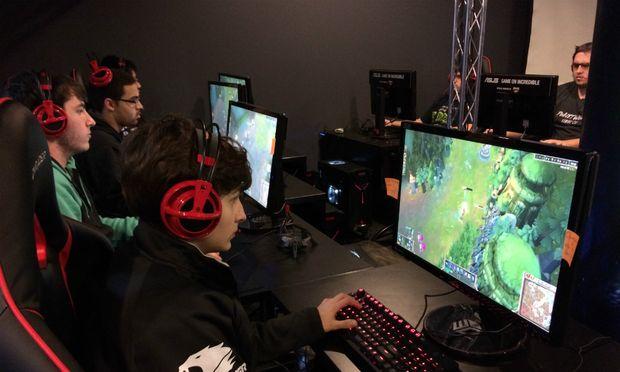‘Am I trans?’ One teen’s quest and how gaming helped
Razur, formerly known as Rachel, plays a video game at Robert Morris University.
Rachel, born a woman — but not sure if she completely identifies as one — has found comfort in the world of online gaming. The cross-gender play that gaming allows is an accessible, low-barrier way to dip a toe in the waters of identity exploration. She's not sure what gender she identifies as, and in the world of gaming, that's okay.
She grew up in Woodstock, Illinois — a rural town most famous for its ordinariness. In 1992, Woodstock played the role of wholesome, unchanging hamlet as the backdrop in "Groundhog Day." She never felt quite ordinary enough for Woodstock. She didn't want to wear dresses. She didn't want to play fairy princess. She was bullied and picked on. Elementary school and middle school were, to put it lightly, kind of a nightmare.
Like countless solace-seeking children in countless ordinary towns, Rachel turned to some invisible friends. The difference, of course, was that her invisible friends really did exist — just far away, on the other side of a microphone. First came World of Warcraft, then League of Legends; she took up online games in which players see the same thing happening on screen and talk through headsets as they take down magical enemies.
Just about every night throughout high school, Rachel would get online and play. She was pretty good at it — and she got even better. Eventually, she was invited to joined a team of guys from all over the English-speaking world.
At first it was a little weird having a girl on the team, Rachel says, but she was a good player, disciplined and hardworking. And after a while, her teammates saw her for who she was: a character on screen and a voice in the team voice chat. They actually forgot she was a girl at times, referring to her as “he”. That was just fine by Rachel — who was, by then, referring to herself as "Razur," a childhood nickname-turned-gaming-handle.
"I’m like 'you know, it's OK guys if you want to call me 'he.' That's OK! You can absolutely do that,'" Rachel says. One day, she decided to bring it up explicitly: "I’m like, 'alright, so, I was playing with the idea that maybe I was transgender because, uh, I don’t like girly things."
It was cathartic — and surprising to Razur, because some of her teammates even admitted to questioning their own certainties about their respective genders. Here was a community willing to let her literally play with a new identity online.
Not everyone, however, finds the gaming world quite so welcoming, a problem dramatically encapsulated in the "GamerGate" debates last fall, centered around the treatment of women and minorities in gaming culture. On this week's show, we asked Colleen Macklin, game designer and professor at Parsons School of Design, what this kind of controversy might mean for the Razurs of the gaming world, the people using games to figure out who they are. We also spoke with game designer and professor at New York University's Game Center Naomi Clark, someone who not only designs and studies games, but used them decades ago to explore and establish her own gender identity.
Razur, at least, is feeling out her possibilities now. She writes:
"I still feel unsure about whether or not I’d like to transition in the future but that’s OK! I’m really happy and comfortable being who I am right now. I want to work toward better representing women in video games, and I know I don’t need to be 'girly' to do that. I need to be the best at who I am and that path should lay itself."
This story was adapted from the WNYC podcast New Tech City, which tells compelling stories of how technology is reshaping New York and the nation.
Subscribe to New Tech City on iTunes, or on Stitcher, TuneIn, I Heart Radio, or anywhere else using this RSS feed.
